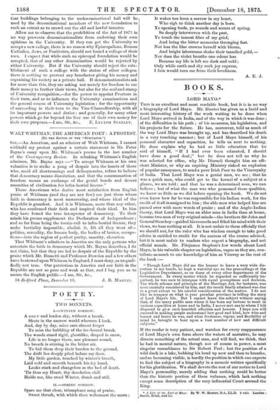WALT WHITMAN, THE AMERICAN POET : A PROTEST.
[TO THE EDITOR OF THE "SPECTATOR."]
Sin,—An American, and an admirer of Walt Whitman, I cannot withhold my protest against a certain statement in Mr. Peter Bayne's essay upon Mr. Whitman's poems in the last number of the Contemporary Review. In rebuking Whitman's English admirers, Mr. Bayne says To accept Whitman at his own valuation is to strike a pang of despair into the hearts of those who, amid all shortcomings and delinquencies, refuse to believe that democracy means dissolution, and that the consummation of freedom means an exchange of the genial bonds and decent amenities of civilisation for infra-bestial license."
Those Americans who derive most satisfaction from English praise of Whitman (and they are not few) are just those whose faith in democracy is most unwavering, and whose ideal of the Republic is grandest. And it is Whitman, more than any other, who has confirmed their faith and inspired their ideal. In him they have found the true interpreter of democracy. To their minds his poems supplement the Declaration of Independence ; and so far from being the tocsin-call to infra-bestial license, they make bestiality impossible, abolish it, lift all they treat of— politics, sexuality, the human body, the bodies of brutes, occupa- tions—into the region of perfect purity, sanctity, elevation.
That Whitman's admirers in America are the only persons who entertain the faith in democracy which Mr. Bayne describes, I do not claim, but that they are led to despair of the Republic by the praise which Mr. Rossetti and Professor Bowden and a few others have bestowed upon Whitman in England, I must deny, as unquali- fiedly not true. Our patriotism in America and our faith in the Republic are not so poor and weak as that, and I beg you so to assure the English public.—I am, Sir, &c.,
38 Bedford Place, December 13. J. B. MARVIN.






































 Previous page
Previous page